|
|
|
Sort Order |
|
|
|
Items / Page
|
|
|
|
|
|
|
| Srl | Item |
| 1 |
ID:
092373
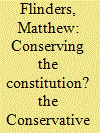

|
|
|
|
|
| Publication |
2009.
|
| Summary/Abstract |
In 2008 David Cameron declared that the Conservative party was 'ready for government' and suggested that 'the change we need is not just from Labour's old policies to our new policies… It's about a change from old politics to new politics'. This 'new politics' narrative is something of a cliché: British constitutional history reveals a regular pattern whereby opposition parties renege upon implementing far-reaching constitutional and democratic reforms once they win power. It is in this context that this article draws upon documentary analysis and a number of interviews to examine the Conservative party's position on constitutional reform and democratic renewal. It concludes that although the Conservative party has spent the last decade decrying the 'destruction' of the constitution it has undertaken little detailed preparatory work in relation to how it might seek to alter the governance of Britain. As a result the research presented in this article provides a number of insights into elite politics, strategic game-playing and executive veto capacities within a context of growing political disengagement from politics and falling levels of trust in politics.
|
|
|
|
|
|
|
|
|
|
|
|
|
|
|
|
| 2 |
ID:
091111
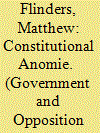

|
|
|
|
|
| Publication |
2009.
|
| Summary/Abstract |
'The Governance of Britain' agenda represents Gordon Brown's attempt to respond to long-standing criticisms regarding the way in which Labour governments have since 1997 approached the topic of constitutional reform and democratic renewal. The central argument of this article is that the Labour Party remains afflicted by constitutional anomie and these recent documents, combined with the behaviour of politicians, have done little in response. This article is of methodological importance because it assesses the cumulative impact of recent reforms through the application of Lijphart's framework and reflects on the utility of this tool. It is of conceptual importance because the results of the systematic analysis add further weight to the accusation of constitutional anomie while also allowing the development of a new conceptual tool - bi-constitutionality - which offers a way of understanding long-standing debates. The article is of normative importance because it avoids the descriptive-prescriptive approach to constitutional literature that has dominated British political studies, and it is relevant for comparative politics because it replicates and takes forward a methodology that has been applied around the world. In doing so it provides a critical case of executive politics and statecraft vis-à-vis constitutional reform.
|
|
|
|
|
|
|
|
|
|
|
|
|
|
|
|
| 3 |
ID:
149245


|
|
|
|
|
| Summary/Abstract |
The Cities and Local Government Devolution Bill 2015–2016[HL] was introduced into the House of Lords as Bill No. 1 in the 2015–2016 parliamentary session. The Bill forms a critical element of the government's high-profile policy of devolving powers and responsibilities to local areas within England. The transition from first-generation ‘city deals’ to second-generation ‘devolution deals’ within five years provides a sense of the pace and development of the reform agenda but there is also a strong sense that something is missing. ‘Missing’ in the sense of an understanding of the specific type of devolution on offer, ‘missing’ in the sense of how an explosion of bilateral new ‘deals’ will be offset against the obvious risks of fragmentation and complexity, and ‘missing’—most importantly—in relation to the democratic roots that might be put in place to counterbalance the economic thrust and make the reform agenda sustainable. It is in exactly this context that this article argues that the full potential of the current devolution agenda will only be realised when the Conservative government fulfils its September 2014 commitment to wider civic engagement about how England is governed.
|
|
|
|
|
|
|
|
|
|
|
|
|
|
|
|
| 4 |
ID:
133232


|
|
|
|
|
| Publication |
2014.
|
| Summary/Abstract |
Attitudes to quangos are paradoxical. On the one hand they are perceived to be undemocratic, unaccountable organisations, while on the other they are seen to improve effectiveness, limit political interference and increase public confidence in government. This paradox is reflected in the behaviour of political parties, which generally adopt a harsh line towards quangos in opposition, but come to rely on these bodies in office. Ahead of the 2010 general election it was, however, noticeable that the Conservative party rejected this dynamic by promising to pursue 'a more sophisticated approach'. This article explores the Coalition government's subsequent 'public bodies reform programme', assessing its progress against recommendations contained within the Institute for Government's Read before Burning report of July 2010. It concludes that while the Coalition has addressed long-standing concerns about the day-to-day governance of public bodies, it has failed to resolve a set of broader and strategic (metagovernance) issues.
|
|
|
|
|
|
|
|
|
|
|
|
|
|
|
|
| 5 |
ID:
118235


|
|
|
|
|
| Publication |
2012.
|
| Summary/Abstract |
In the last decade the role of the Prime Minister in the process for making senior Church appointments has changed significantly. The man who replaces Dr Rowan Williams-and it will be a man-will be appointed through a procedure in which the Prime Minister is expected to enjoy no choice but to simply confirm the Church of England's preferred candidate. The aim of this article is to draw upon fresh empirical research in order to explore why and how the politics and governance of ecclesiastical patronage has been recalibrated in this way. More importantly this article seeks to embed the study of ecclesiastical patronage within a much broader appreciation of how other forms of ministerial patronage have also become tightly constrained. This, in itself, forges a connection between the role of politicians in senior Church appointments, on the one hand, and a much richer and broader seam of research and writing that poses distinct questions about the nature of modern governance, the benefits of depoliticisation, the accountability of appointment commissions, the capacity of politicians and the future of democracy.
|
|
|
|
|
|
|
|
|
|
|
|
|
|
|
|
| 6 |
ID:
099085
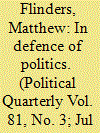

|
|
|
|
|
| Publication |
2010.
|
| Summary/Abstract |
In this, my inaugural lecture, I wanted to sing out in praise of politics! This seemed such a good idea twelve months ago, but now in the wake of even more stories about MPs not declaring foreign trips and former ministers demanding 'cash for access' the idea of trying to defend politicians and praise politics suddenly seems like a very bad idea. And yet it is exactly because politics is held in such low esteem that the lecture is so important. Democratic politics matters because it achieves far more than we generally give it credit for. I want to rediscover the essence and arguments of Bernard Crick's classic book In Defence of Politics because its arguments are more appropriate today than when they were first published in 1962.
|
|
|
|
|
|
|
|
|
|
|
|
|
|
|
|
| 7 |
ID:
118211
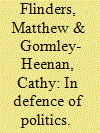

|
|
|
|
|
| Publication |
2012.
|
| Summary/Abstract |
In a world that is increasingly dominated by literary hyperbole there can be no doubt that Bernard Crick's In Defence of Politics remains a classic text. Classic not just in the sense that it provides a masterly account of the essence, meaning and fragility of democratic politics but classic in the sense that it is written with a style, verve and passion that is rarely found within political science. If the test of pretensions to 'a classic' status is that a book defies the passage of time in terms of significance and argument then Crick's Defence would also make the grade for the simple fact that its arguments remain arguably far more important today than they were when they were first published exactly fifty years ago. This article reflects on the contemporary significance of Crick's Defence by defending politics against an updated set of adversaries in the form of: public expectations, marketisation, depoliticisation, the media, and crises before locating the book within the contours of current debates about public disengagement, the rise of 'disaffected democrats' and questions concerning the future and relevance of political science.
|
|
|
|
|
|
|
|
|
|
|
|
|
|
|
|
| 8 |
ID:
118212
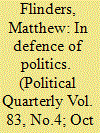

|
|
|
| 9 |
ID:
168753


|
|
|
|
|
| Summary/Abstract |
By failing to acknowledge the link between the design of our political institutions and growing levels of anti‐political sentiment, the restoration and renewal programme risks falling into a trap of its own making. Involving the public from the outset in an open review of the (re)design options for Westminster—in a positive and confident conversation—ensures the best opportunity for meaningful engagement between the public and the future of their democracy.
|
|
|
|
|
|
|
|
|
|
|
|
|
|
|
|
|
|
|
|
|